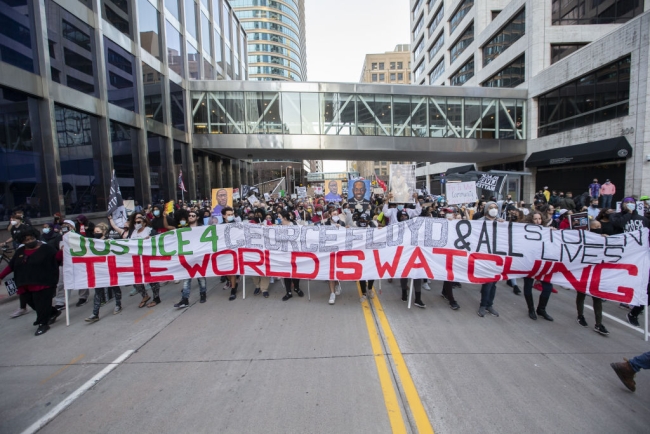You have /5 articles left.
Sign up for a free account or log in.

Protesters demanding justice during Derek Chauvin trial
Anadolu Agency/Getty Images News
As the world watches the trial of former Minneapolis police officer Derek Chauvin for the murder of George Floyd, students on college campuses across the country are trying to make meaning. It is what we do: our highest calling may be to use all the knowledge, skills and tools we have at hand to make sense of the world in which we live. When tragedy strikes, when our sense of humanity is at stake, it is all the harder -- and all the more important.
Sunday’s news that another unarmed Black man, named Daunte Wright, was killed by law enforcement in the Twin Cities following a traffic stop compounds the grief we already are feeling about police brutality, racism and the systems of oppression that foster an environment in which the killing of unarmed Black people by police is a regular feature of American life.
We write as presidents of liberal arts colleges to raise the alarm that now is a time for action. We are united to advance the work of antiracism and equity in higher education and in society, and we invite other campus leaders across the country to help ensure that the humanity we profess to value reaches deep into the heart of pain to make the world stronger and better.
In the Twin Cities, Macalester College sits just miles from the site of Floyd’s death, from the courthouse where the Chauvin trial is taking place and from the site of Wright's killing this week. At Pomona College, in Los Angeles County, many of us remember the 1992 trial of the officers charged with the beating of Rodney King. It still feels raw. One of us was a senior in college that year, and the other was a young graduate student; both of us felt the trauma of injustice for ourselves at the ages our students are now. And we as leaders -- but more important, deep in our hearts as human beings -- understand that people on every campus in the United States are experiencing feelings of righteous anger, fear and dread.
The killings of George Floyd and Daunte Wright by law enforcement officers are part of a long history of police brutality wielded against communities of color, especially Black Americans. We need to face and understand this history if we are to imagine a different future.
Black, Indigenous and other people of color on our campuses are tired. Tired of grief. Tired of trauma. Tired of explaining and performing our grief and trauma for people who previously were unaware of or unbothered by racism, social inequality and violence. We know the brutality of racism has never gone to sleep, even though some people seem to have just awoken to its reality. This history has been staring us in the face for a long time and, while some of us are unable to ignore it, we in America’s colleges can teach how to open eyes and ears.
Higher education plays a vital role in shaping the society we want for ourselves. Helping people on our campuses and in our communities understand the Chauvin trial and its implications -- no matter the verdict -- is an important function we can and should serve. The trial testimony is hard to hear, but healing cannot happen unless the truth is aired and people are given the opportunity to express their feelings about what happened.
One of the foundational concepts of education is evidence. Ultimately, it will be up to 12 individuals on a jury to determine guilt or innocence. But we all have an obligation to consider and evaluate the testimony we see and hear. The raw emotions of the past week, including those described in firsthand accounts of witnesses watching or hearing a life pass from this earth, make the tasks of analysis harder. We talk about this a lot on our campuses. Conversations that cause pain do not easily lead to knowledge, understanding or change. That is in part because knowledge that comes with pain is costly. It requires work and that we be willing to change our minds and hearts.
Nonetheless, we call on our country to pay this cost. To listen with open ears. To hear. Indeed, crucial conversations are happening right now about the role of policing, about how city budgets are moral documents -- not just financial ones -- and about alternatives to armed law enforcement for responding to community needs such as mental health crises, substance abuse, homelessness and nonviolent juvenile offenses.
Liberal arts colleges can and should contribute to those conversations. We bring critical thinking, interdisciplinary analysis and moral virtues like courage and honesty to the table. Just like the witnesses who took the stand last week, when we see things that are not right, we name them, call them out, document them and explain the consequences of what we observe.
We also teach our students and want them to practice that we can use our hands and hearts to create beauty, too, and that the arts we practice come from and lead to the conversations and actions that can shape the future we want to see.
We cannot bring Mr. Floyd or Mr. Wright back, but we can honor their memories by working together to create a more just and peaceful world.




